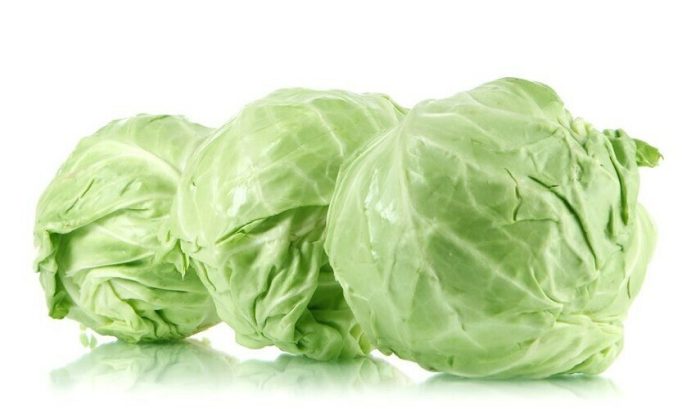Medical experts recommend fruits and vegetables for disease prevention and chronic health.
Green and leafy vegetables are frequently emphasized by medical and nutrition experts, and cabbage is one such vegetable with numerous advantages. Cabbage is a vitamin and mineral-rich food. So, let’s take a look at a report prepared by Turkish news agency TRT under the supervision of medical experts on how this vegetable affects our health.
Healthy Digestive System Because of its high vitamin C content, cabbage protects against infectious diseases and strengthens the digestive system. 100 grammes of cabbage provides 40% of the daily vitamin C requirement for the human body. The amount of vitamin C in cabbage decreases when cooked for an extended period of time or when it becomes stale.
Reduced Cholesterol Two substances found in cabbage compete with cholesterol for first absorption by the digestive system, thereby lowering bad cholesterol.
Cabbage promotes eye health and prevents the formation of cataracts.
Anti-Inflammation Because of its antioxidants, cabbage aids in the reduction of inflammation in our bodies.
Bone health protection and blood clotting that is beneficial There is a risk of developing bone diseases such as osteoporosis and not having a balanced form of clotting in the blood due to a lack of vitamin K in the body. Cabbage is an excellent source of vitamin K. One serving of this vegetable contains 85% of the daily recommended amount of vitamin K.
Anti-cancer According to some studies, cabbage can help fight certain types of cancer. Cabbage’s anti-cancer properties are due to its antioxidant and anti-inflammatory properties. Furthermore, the special Sulphur substances in it transform the body into a cancer fighter.
Anti-Inflammation Because of its antioxidants, cabbage aids in the reduction of inflammation in our bodies.
Cabbage leaves are high in vitamin B. Cabbage is also an excellent source of B group vitamins. Vitamins in the B group are extremely beneficial to the nervous system as well as the digestive system. One cup of cabbage, eaten as a meal or in a raw salad, provides 10% of the body’s daily B vitamin requirement.
Because of its low-calorie content, this vegetable is beneficial for dieting. Cabbage has 24 calories per 100 grammes. It is especially beneficial when eaten raw. Satiety lasts a long time due to the high amount of pus. Because of its long stomach stay and absorption of vitamins K and A into the blood, cabbage keeps hunger pangs at frequent and short intervals. Because vitamins K and A are oil soluble, use a small amount of vegetable oil when preparing cabbage as a salad or meal.
Edoema / Venous Water Drainage The fenugreek seeds and other substances found in cabbage aid in the removal of water accumulated in the body’s veins, improving blood circulation. This vegetable removes both water and sodium from the body, lowering blood pressure as a result. Those suffering from diseases such as high blood pressure and water retention in the body, i.e. edoema, can consume cabbage as food or salad.
A calcium treasure trove Cabbage is also an excellent source of calcium. 100 grammes of cabbage provide 10% of the daily calcium requirement. To protect teeth and bones, it can be consumed raw or cooked.
Anti-constipation Because of the Sulphur content, cabbage allows the digestive system to function more efficiently. Aside from that, the abundance of pusa in its leaves helps to move the bowels and relieve constipation.
Antioxidant with High Potency Because of its high antioxidant capacity, cabbage fights free radicals in the body and prevents cancer. Aside from that, it relieves digestive system diseases, liver diseases, and obesity.
Aids in the management of diabetes According to new research, cabbage lowers the risk of type 2 diabetes.
Obesity Control Cabbage promotes safe and healthy weight loss. Pusa is an absorbed carbohydrate rather than a digested carbohydrate. This is why cabbage increases the volume of food and, due to the carbohydrates absorbed by surrounding the space in the stomach, it makes you full faster and prevents hunger for an extended period of time.
Pickling Cabbage Making cabbage pickles adds prebiotic properties to this vegetable. However, adding salt to pickles can reduce their prebiotic properties. Prebiotics are beneficial bacteria found in the intestines that keep the intestines healthy and protect against various diseases. It should be pickled in vinegar, and vinegar water should be used in addition to the pickle.
What precautions should be taken when working with cabbage?
Individuals taking blood-thinning medications should exercise caution when eating cabbage. Because certain substances in cabbage slow thyroid gland function, people who already have an underactive thyroid gland should limit their consumption of this vegetable. This vegetable should be consumed no more than twice a week.


